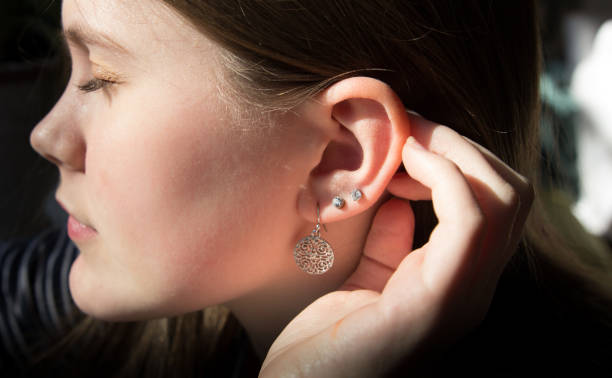Hello everyone!
Today's topic was suggested by one of my readers. This person left a message on one of my most popular blog posts: Misconceptions about ear piercings
There are several metals that are safe for body piercing and others that aren’t. The wrong type of metal can stall the body’s healing process or cause an allergic reaction. Nickel is a common culprit for skin irritation. Contrary to popular belief, nickel is used in both inexpensive and expensive metals. In less expensive jewellery, nickel is often used in the base metal which is then plated with gold or silver. Even the smallest quantity of nickel can cause the skin to turn black, green, or another colour.
Unlike some other allergic reactions, a nickel response happens slowly with repeated or prolonged exposure. In most people, it causes excessive itchiness and a dry, scaly red rash; also known as allergic contact dermatitis. This kind of dermatitis (also called eczema) develops in places where nickel-containing metal is touching the skin. Once a contact allergy is developed, it can occur after a few moments of contact with the allergen. Approximately 20% of the U.S. population suffers from metal allergies, and that number continues to increase because so many people wear earrings that contain highly reactive metals.
Metal allergies are commonly associated with earrings and other jewellery, particularly jewellery associated with body piercings. The best strategy to prevent developing a metal allergy is to avoid prolonged exposure to items containing nickel, especially jewellery.
If you already have a metal allergy, the best way to prevent an allergic reaction is to avoid contact with the metal. Many people who suffer from metal allergies can stop their symptoms by switching to a purer metal, rather than an alloy. Some people are only allergic to nickel, while others are allergic to copper, or any non-pure metal.
Best metals for ear/body piercing
- Surgical stainless steel is often a good choice for people with allergies, except in cases where people have hypersensitivity. In this case, titanium should be used.
- Titanium is a great metal for initial piercings; it’s comfortable due to being lightweight and it barely contains nickel.
- Niobium is similar to titanium but it’s heavier and softer.
Metals to avoid
- Sterling silver is an alloy. It is at least 92.5% silver, while the other 7.5% is usually copper, though it may also be nickel.
- Iron not only rusts easily but also reacts very easily and can cause severe reactions.
- Plated gold flakes off and exposes the inner metal.
- Low-grade metals such as copper, nickel, tin, zinc, and brass aren’t proper choices for body piercings. They can cause allergic reactions and infections, or even cause the body to completely reject the piercing.
It’s always best to keep to safe metals to ensure proper healing. Once the piercing is completely healed, you should purchase jewellery that is made of materials that aren’t likely to cause allergic reactions. Look for jewellery made from such metals as nickel-free implant grade titanium, 18-karat yellow gold, or nickel-free 14-karat yellow gold. Get rid of jewellery that contains nickel or has caused an allergic reaction. Be sure that your earring backings also are made of hypoallergenic materials.
I recently developed a metal allergy myself and now, I only wear stearling silver or 18-karet gold earrings.
Do you suffer from a metal allergy? Which earring can you wear?


